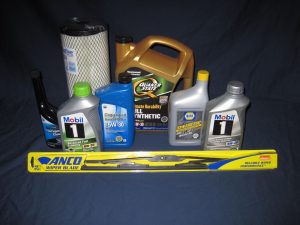A recent post here presented info about synthetic oil versus conventional (mineral) oil, so check out that post if you need to.
Here’s a little more about these two basic types of oils, and then we’ll look at oil brands.
If you make lots of short trips, conventional (mineral) motor oil may never get warm enough, especially during cooler months, to burn off some moisture and impurities. Conventional oil will then break down and not work as well as synthetic oil. Also, here in the southwest, the very hot summers can cause conventional oil to break down somewhat more quickly than synthetic oil. Synthetic oil maintains its lubricity and other attributes better and longer than conventional oil does.
Whatever oil you use, it’s important to not extend oil changes beyond the time interval recommended by the manufacturer – experts recommend changing the oil at least once a year even if you haven’t driven a lot.
Synthetic oil is also good for older engines which can be more prone to sludge buildup. The gunky residues that can block oil passages may lead to shortening the life of an engine as it’s then not getting lubricated properly. This sludge forms when oil breaks down and when dirt, tiny metal particles and other contaminants are not removed. Synthetic oil is less likely to form sludge, lubricates more evenly and is usually better at cleaning out old sludge.
So what about different brands of oil?

As is the case with many products, there are lots of opinions on which oil brands are best.
Hopefully, this will help:
Most brands of oil come from only a few sources. In other words, you may be considering two or three brands, when actually those all came from the same producer. It’s the additive packages that will make them different. Even then, those additives, which do things like control viscosity, help engines stay cleaner inside, help seals and gaskets last longer, or help the oil flow better, are similar in the different brands.
So how does InSite OilChange choose an oil brand? Four ways:
- Almost all oil brands comply with certain government and other standards, such as those of the API (American Petroleum Institute). These standards are good enough to ensure that the oil is of a good quality. You may find “off-brands” at discount stores that only comply with older standards, or barely meet minimum government standards, and those should be avoided. Saving a couple dollars on cheap oil may cost you a lot more in engine wear over time. But any well-known oil brand is good oil. Examples: Mobil, Chevron, Valvoline, Pennzoil, Castrol, Quaker State, etc.
- We have researched the different brands. Each of them claims theirs is the best, of course. But we’ve read test results from the API, from the oil manufacturers and from some independent sources, and here’s what we’ve seen: Certain brands such as Amsoil and Mobil 1 appear to do a fractionally better job of everything oil’s supposed to do under the most extreme conditions. By “extreme conditions” we mean running the Baja 1000, a 1000 mile high-speed race over tortuous desert terrain, or the 24 Hours of Le Mans, another event that is very, very hard on engines. But for 99% of the time, including your many short in-town trips in 110-degree weather, or your 75-80 mph drive to LA and back, any good oil brand will do the job very well. Because those are exactly the jobs they’re made for.
- We buy a lot of oil, and to get that quantity it has to come from an oil distributor, not a retail store. We use Service Pro brand oil almost exclusively. It’s available to mechanics, lube shops and other businesses, and is not sold on the retail shelves at your local auto parts or department store. We buy it because unlike some other “shop brands” or mechanic’s brands, when Service Pro needs more oil, they go to the big name refiners and get the best price, and they buy that oil. So what we’re getting is the same as, for example, Mobil, Chevron, Pennzoil, or some other top brand. There are other shop brands we can buy, but some of them buy overstocks, leftover supplies or other discounted oils and then sell it, and we’re interested only in the best. By the way, if you do want another brand, we can get it for you.
- Do you drive a German car? It probably requires not only full synthetic, but the “European blend” full synthetic. Does your vehicle have a lot of miles on it? “High mileage” oil contains more of the additives that clean out gunk and help gaskets and seals. So it’s important to use the right type, and we always do that.
If you still have questions, just call or email…





